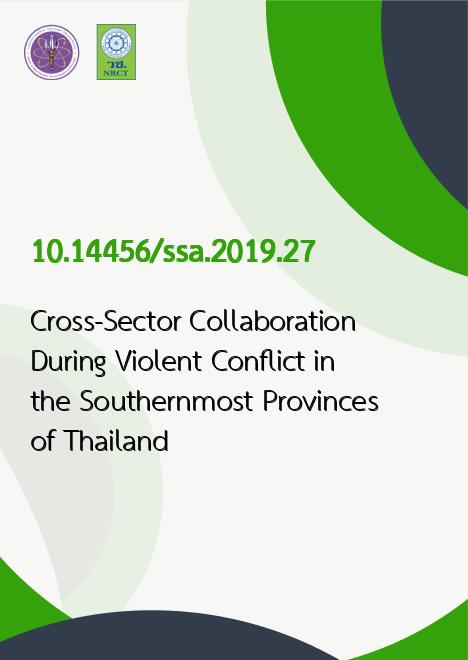
|
Cross-Sector Collaboration During Violent Conflict in the Southernmost Provinces of Thailand |
|---|---|
| รหัสดีโอไอ | |
| Creator | Thanikun Chantra |
| Title | Cross-Sector Collaboration During Violent Conflict in the Southernmost Provinces of Thailand |
| Publisher | National Research Council of Thailand |
| Publication Year | 2562 |
| Journal Title | SOCIAL SCIENCE ASIA : Official Journal of National Research Council of Thailand in conjunction with Journal of Politics and Governance |
| Journal Vol. | 5 |
| Journal No. | 4 |
| Page no. | 43-58 |
| Keyword | Cross-sector collaboration, peace and conflict, Deep South Thailand |
| URL Website | http://e-journal.nrct.go.th/ |
| Website title | e-journal |
| ISSN | 2229-2608 |
| Abstract | The struggles between Malay-Muslims and Thai authorities in the southernmost provinces of Thailand, namely Yala, Pattani, Narathiwat, and four districts of Songkhla, have been ongoing for more than a century and there seems to be no end in sight. Interestingly, the Thai security policy regarding the violence in Deep South from 2004, which was the year that the violence re-emerged and expanded, to the present, has gradually changed to promote further participation and collaboration between state- and non-state actors. This article aims to examine cross-sector collaboration in the conflict area of the southernmost part of Thailand by focusing on both state- and non-state actors. Moreover, the article will investigate the role of the state and its agencies, as well as the governmental response to the political activities of people in the conflict area, through the lens of cross-sector collaboration. Based on interviews with governmental officials, civil society activists, and local people, as well as field work in the Deep South of Thailand, this article found that the ongoing conflict and violence did not only lead to more violence and negative impacts, but also influenced an increased awareness and led to changes in the collaborative activities between the Thai state and the MalayMuslim people. However, even though the Thai government has recently worked to provide more channels of cross-sector collaboration to the Malay-Muslims, collaboration in the conflict area is still restricted by the State's close watch and tight control under the application of martial law. Therefore, although the state's policy has gradually changed to be more open to participation and collaboration, due to the continued feelings of suspicion and distrust, and the concern of national security, the state still maintains centralized power and exercises control over the participation of Malay-Muslims in cross-sector collaboration. |